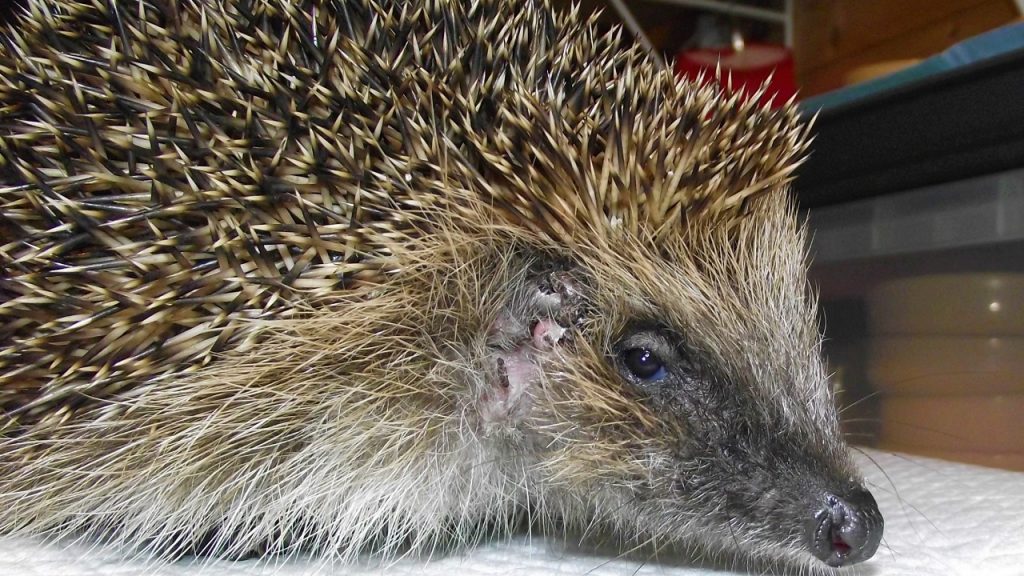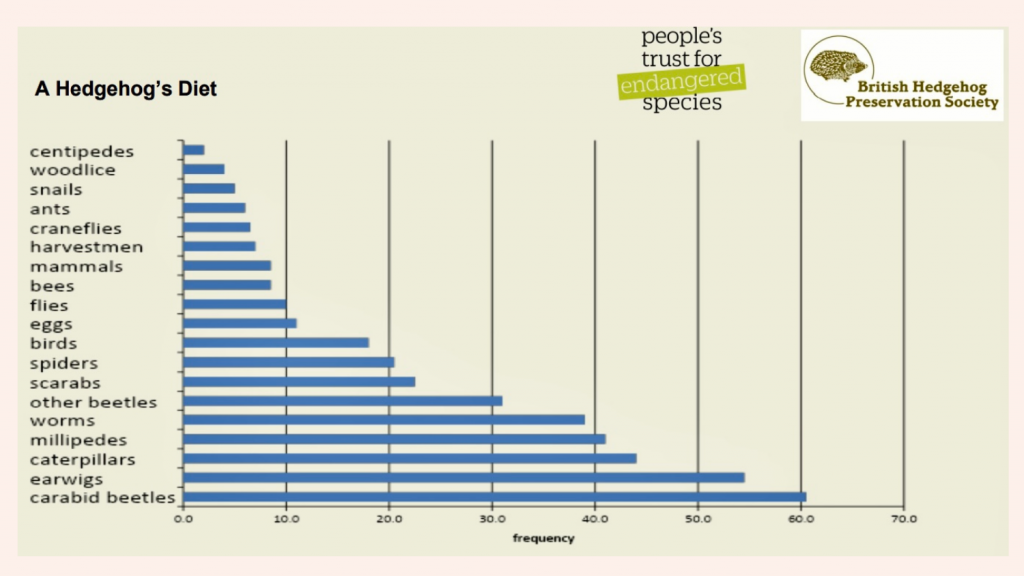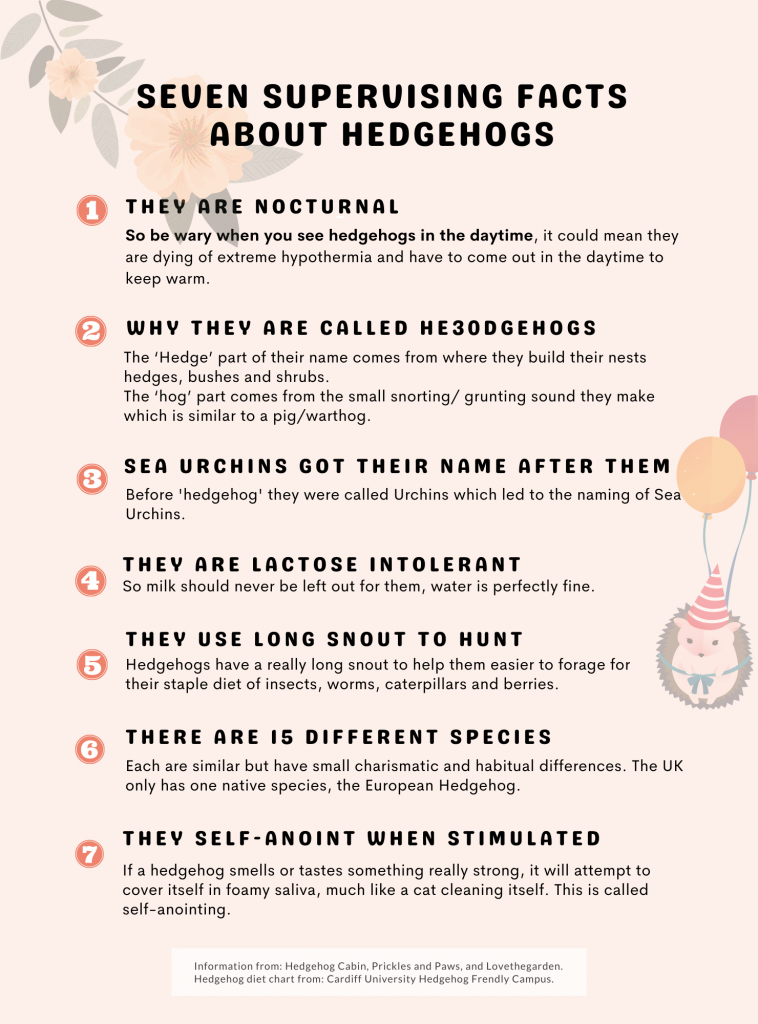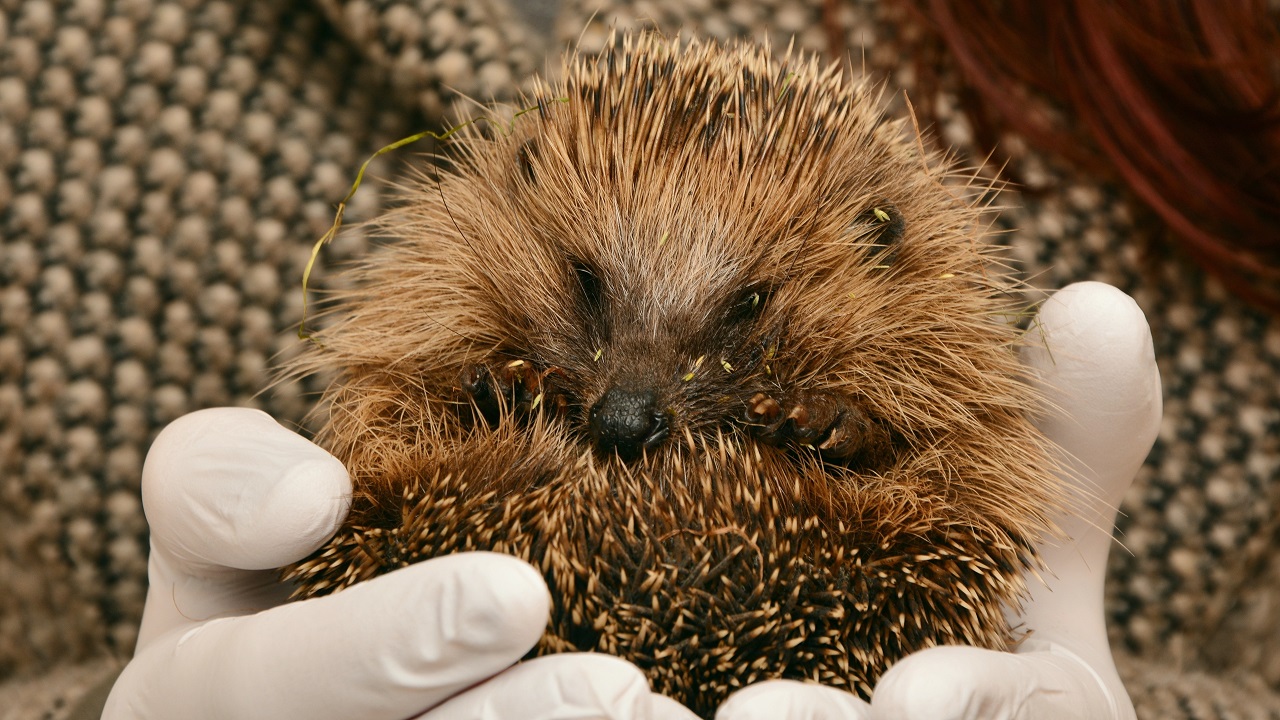The British hedgehog is vulnerable to extinction according to the Mammal Society. What are people doing to alleviate the situation?

Sound like a baby’s cry, but much more stressful and shriller than a cat’s shriek, the scream of little hedgehog, Teddy, cut through the silent night as he was picked up by the dog, shaken and thrown into the air.
“Shhhhh….shhhhhh…there, there…” Lady Pauly, an NHS nurse specialising in infectious disease control, has run Hedgehog Cabin in Hampshire on her own since 2000. She slowly cradled the frightened baby hedgehog and gently wrapped him in a thin towel, soothed him and carefully checked his injuries.
“Such an anguished and terrifying sound that hedgehog scream is, which directly hits your heart, and I never ever want to hear it again,” said Pauly. Teddy’s screaming resounded across the road to Pauly’s Hedgehog Cabin as a man carried him in his arms. She gazed out in worry from her kitchen when she first heard the sound and rushed towards little Teddy, getting him to the ward immediately.
“It’s a moral responsibility for us as humans to protect and look after wildlife, and anyone who is vulnerable,” said Pauly. She resolved to set up a high standard hedgehog rescue centre when she noticed that qualified and roomy hedgehog hospitals were in such short supply.

With their soul-melting eyes and unique adorable appearance, hedgehogs have always had a place in the hearts of the British people. From the popular tale of Mrs Tiggy-Winkle in 1905 to won the BBC Wildlife Magazine’s People’s Choice poll and became the national icon animal, hedgehogs is part of British cultural heritage.
They are one of the gentlest animals as well, which have opened the gate for people to develop a fascination with the natural world. According to the Royal Society of Biology, hedgehogs are a gardener’s friend and will be delighted to dine on caterpillars in your garden.
However, wild hedgehog populations have been declining sharply; more than half of the hedgehog population have died since 2000 according to the latest research from the British Hedgehog Preservation Society (BHPS). There are fewer than one million hedgehogs in the UK, while in the 1950s, the number was 36 million.
Rapidly growing urbanisation and human activities, such as the abuse of pesticides, excessive removal of insect larvae and the reduction of larger fields and hedgerows, has resulted in a loss of habitat and food sources for hedgehogs. The national star will die out fast if no further action is taken.
Various organisations and wildlife lovers are coming together to find a way out of this plight. Hedgehog Street (a national wildlife charity set up by the People’s Trust for Endangered Species) and the BHPS are campaigning several projects, including Hedgehog Friendly Campus, Hedgehog Awareness Week and the Hedgehog Friendly Football League, and Monitoring Rehabilitated Hedgehogs. These projects are intended to mobilise various communities, such as universities, rescue stations and sports clubs, to protect hedgehogs and increase public awareness.
The general population are also active in their efforts. More than 70,000 people from all over the country are registered on Hedgehog Street’s website supporting their campaign by participating in the protection of hedgehogs daily.
As the representative champion in the domain of hedgehog rescue, Lady Pauly has devoted all her time and energy to helping injured and sick hedgehogs.
“’The winter before I posted on Twitter to ask for donations, I had to sell my staff even my shoes to pay the electric bill to heat Hedgehog Cabin. I also had to sell my handbag, my precious, lovely handbag. You know what that means to a woman,” said Pauly laughing out loud.
She was awarded the best Rescue Centre by Wetnose Animal Aid (the non-profit wildlife Animal Rescue Centre) last December. “I think I could do it so much better than anyone else,” said Pauly, laughing shyly but proud. Although she is 66-year-old now, she still works 16 hours a day, every day, just as she did in the past 11 years that, against the huge decline in the number of British hedgehogs, saving thousands of hedgehogs from various harm.
“Taking care of hedgehogs doesn’t only mean helping them back to health. More important, is how to change the situation,” said Pauly. “Giving the public the right information is definitely the essential part.”
When she shared detailed knowledge on Twitter three years ago, she soon found out that most people did not even know that Tesco’s basic cat food could provide good nutrition for hedgehogs, while the high-priced variety of so-called hedgehog food was mostly unlicensed and potentially harmful.
‘That infuriates me, not only because of the harm it does to the hedgehogs, but because they’re taking advantage of the sweetest kind of people. It makes me so cross.’
It was not meant to be a campaign, said Pauly, but with more and more people’s participation, over 10,000 people began to feed hedgehogs with Tesco’s kitty food, so much so that Tesco recognized it and reduced the price from £1.10 to 75p.
“Educating people is so important, it will help them know what’s best for hedgehogs and reduce the unnecessary harm,” said Katy and her mother Diane, who established Prickles & Paws, the biggest hedgehog rescue centre in Cornwall. “A lot of people used to think feeding them bread and milk was good, which it obviously isn’t at all.”
“Every single hedgehog through these doors in the last five years, every single one, has been suffering from starvation. That should not happen in our country. We are not some little poor districts, we’re a wealthy country. Everyone can afford a 75-penny box of kitten food” said Pauly. She states that because a huge mass of the population doesn’t know the truth about hedgehogs, such as they think hedgehogs can eat slugs and snails, they don’t understand how hedgehogs could be starving.

Part from caterpillars and beetles, Pauly states that hedgehogs only forced to eat whatever food is around them when they are starving. “But this will kill them from the invasion of parasites. They carry parasites like lungworm and fluke, which are fatal if not treated,” said Pauly.
“When I started learning to take care of hedgehogs, I read every book on hedgehogs on the market and none of them were good. It seems to me that the rescuers at that time were like doctors were 50 years ago; that ‘we can’t ever tell you our secrets. Because that will stop us feeling special.’
“But that’s selfish. People should help hedgehogs in the larger picture,” said Pauly. “Besides, if you want people to follow you, you need to explain to them why. I think that people have got the time to write them but haven’t got the knowledge to do so. So now that I have the information and experience, I’m passionate about sharing it.”
Meanwhile, Diane and Katy are encouraging children to become conservationists. By giving speeches in schools and recording actual rescues to show the children, they are inspiring the next generation’s interest in hedgehogs.
“Children are the future,” said Diane. “Getting them inspired and able to look after hedgehogs. If we can educate them and get them enthusiastic, then that makes a real difference.”
Through videos and stories from rescue staff about the hedgehogs they have helped, hedgehog champions are striving to appeal to raise awareness about hedgehog conservation and wildlife protection. From Pauly’s ‘Eden’, who was being eaten from the inside by maggots, to Diane and Katy’s ‘Gerry’, who was caught by a strimmer, each individual reflects different characters.

“You’re more likely to care about an individual than just about a nameless species,” said Pauly. “It’s easy to dismiss this species if that’s all you think of, ‘The Hedgehog.’ But if you think of ‘Oh, that’s little Foggy, or that’s Ruby’, they know each hedgehog just like us.”
“There will come a day when I can’t do it anymore physically,” said Pauly, her eyes run red with the reluctance of leaving as she speaks, and states that she wants to write a book to keep helping them in another way.
“But there are sweet people out there. As long as I can make them understanding hedgehog even a little bit, makes all the difference in the world.”
More information about how to protect hedgehogs in the daily life:
More interesting facts about hedgehogs:

